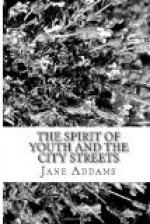The young people are overborne by their own undirected and misguided energies. A mere temperamental outbreak in a brief period of obstreperousness exposes a promising boy to arrest and imprisonment, an accidental combination of circumstances too complicated and overwhelming to be coped with by an immature mind, condemns a growing lad to a criminal career. These impulsive misdeeds may be thought of as dividing into two great trends somewhat obscurely analogous to the two historic divisions of man’s motive power, for we are told that all the activities of primitive man and even those of his more civilized successors may be broadly traced to the impulsion of two elemental appetites. The first drove him to the search for food, the hunt developing into war with neighboring tribes and finally broadening into barter and modern commerce; the second urged him to secure and protect a mate, developing into domestic life, widening into the building of homes and cities, into the cultivation of the arts and a care for beauty.
In the life of each boy there comes a time when these primitive instincts urge him to action, when he is himself frightened by their undefined power. He is faced by the necessity of taming them, of reducing them to manageable impulses just at the moment when “a boy’s will is the wind’s will,” or, in the words of a veteran educator, at the time when “it is almost impossible for an adult to realize the boy’s irresponsibility and even moral neurasthenia.” That the boy often fails may be traced in those pitiful figures which show that between two and three times as much incorrigibility occurs between the ages of thirteen and sixteen as at any other period of life.
The second division of motive power has been treated in the preceding chapter. The present chapter is an effort to point out the necessity for an understanding of the first trend of motives if we would minimize the temptations of the struggle and free the boy from the constant sense of the stupidity and savagery of life. To set his feet in the worn path of civilization is not an easy task, but it may give us a clue for the undertaking to trace his misdeeds to the unrecognized and primitive spirit of adventure corresponding to the old activity of the hunt, of warfare, and of discovery.
To do this intelligently, we shall have to remember that many boys in the years immediately following school find no restraint either in tradition or character. They drop learning as a childish thing and look upon school as a tiresome task that is finished. They demand pleasure as the right of one who earns his own living. They have developed no capacity for recreation demanding mental effort or even muscular skill, and are obliged to seek only that depending upon sight, sound and taste. Many of them begin to pay board to their mothers, and make the best bargain they can, that more money may be left to spend in the evening. They even bait the excitement of




